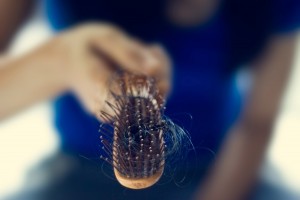
Widening Parts
“Hair loss is an emotional subject for many of my patients,” states Emily Johnston, dermatology certified-physician assistant in Austin, Texas. A large part of determining the cause of hair loss is obtaining a good history. “It is helpful to discuss past medical problems, family history, and any major life changes,” says Emily. “Each of these can have a significant impact on hair growth.” Determining the reason for your hair loss may help your doctor figure out which hair restoration procedure is appropriate.
Why is my hair falling out?!
Alopecia (the medical term for hair loss) is often categorized by its cause and clinical presentation. The most common causes of hair loss include:
Androgenetic
Most commonly effecting men, but also seen in a significant portion of women, androgenetic hair loss results from hormone activity as well as a genetic predisposition. Male pattern hair loss tends to present on the crown of the scalp and the frontal hairline. According to Emily, “a number of effective hair loss prevention products are available for this type of hair loss, including topical minoxidil (Rogaine), an oral medication called Propecia, and treatments like hormonal therapies and others.”
Non-scarring
Telogen effluvium is one of the most common forms of non-scarring hair loss. It results from a disruption in the normal hair growth cycle and leads to excessive shedding. “Various stressors on the body such as illness, childbirth, rapid weight loss, significant emotional stress, or medications can all lead to telogen effluvium” states Emily.
Alopecia Areata is a disorder that results in patches of complete hair loss. “Although many cases will spontaneously resolve with no interventions, localized areas of hair loss can be treated with topical treatments and intralesional steroids injected directly into the bald patches” reports Emily. Persistent or more extensive disease may require more unique approaches, such as contact sensitization or immune modulating therapies.
Scarring
A number of medical and dermatologic conditions can cause scarring hair loss. When not treated early, scarring alopecias can cause irreversible damage to the hair follicles, and hence permanent bald spots. “These conditions respond best to early and aggressive intervention and treatment,” explains Emily.
Structural
Brittle hair may be inherited or acquired through chemical processing or heat styling. If you have brittle hair, it is important to avoid excessive use of damaging agents on the hair.
Deciphering the Depilated
Laboratory studies for hair loss may consist of simple blood work to identify low iron levels, thyroid disorders, hormonal imbalances, and even autoimmune disorders that maybe driving the hair loss. Hair and tissue cultures and even more elaborate testing may be indicated in certain scenarios. A scalp biopsy may be recommended to help identify the specific cause of hair loss. Afterwards, your dermatologist will recommend a hair loss treatment based on his/her diagnosis, this may lead to a hair transplant like this UK smiles for hair transplants.
Contact Us
Emily Johnston, PA-C sees and treats patients at Sanova Dermatology where she provides a full spectrum of dermatologic care. To learn more about how we can help your skin to look its best, please contact us today.
Join Us
